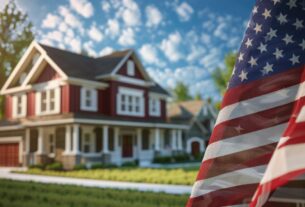Why 55+ Communities Appeal to Active Older Adults
In 1995, the Fair Housing Act of 1968 was amended to include an exemption for housing developments to lawfully exclude families with minor children. This exemption is known as the Housing for Older Persons Act (HOPA).
HOPA allows developments to cater their units to residents aged 55+ as long as it complies with certain qualifications. These qualifications must be met and maintained to avoid the Fair Housing Act exemption being permanently revoked.
The three qualifications a community needs to maintain compliance are 1) the community must advertise its 55+ or age-restricted status, and 2) it must comply with the Housing and Urban Development (HUD) age verification requirements. The third, and most important requirement is that at least one person occupying each unit be at least the age of fifty-five.
Based on these three qualifications, developments have a lot of leeway in how they want to cater to the needs of their residents while maintaining their HOPA status. For example, some communities will allow residents as young as nineteen to reside in a unit with a 55+ person. Other communities encourage families to come to visit and stay with their 55+ relatives for up to 90 days. The flexibility of the law works to keep the flavor of the neighborhood while avoiding the inconvenience of not being able to host guests under the required age.
Who Benefits From Living in a 55+ Community?
As the next generation of workers transitions to retirement, they also consider transitioning their living situation. The modern retiree is healthier and wealthier than previous generations.
Although they enjoy living near their families, they have no expectations or desires to live in a multi-generational home. Active older adults prefer to live independently and take advantage of the opportunity to live near shopping, dining, and healthcare.
Active older adults have a wide range of housing type choices. From custom homes built in master-planned golf course communities to luxury apartment rental communities in resort locations, the market is listening and working to fulfill the active older demographic’s requirements.
Many housing developers are taking note, and building housing to suit the preferences of their residents. The 55+ market has unique features that are easily accommodated by active lifestyle developments.
Reasons To Choose a 55+ Community
Since 1998, there have been several polls to discover what amenities residents of 55+ communities value and what lifestyle changes they look forward to the most. At the top of the list is a sense of community.
Clubhouse and Sports Amenities
A clubhouse and sports amenities on the property are key to a robust community. The clubhouse serves as the heart of the community. It’s where neighbors gather for group activities such as celebratory meals, Happy Hour mixers, regularly scheduled card tournaments, and group arts and crafts sessions. A dedicated BBQ area gives people an outdoor cooking space that is easy to use and maintain.
The sports amenities can include a pool and spa for the exclusive use of the residents and their guests. Some 55+ communities have indoor fitness studios offering treadmills, free weights, and stretching areas. Some have dedicated spaces for group fitness classes and employ a concierge to manage scheduled group activities.
Other fitness amenities include courts for bocce ball, tennis, paddleball, and basketball. You may also find putting greens and horseshoe pits. If the property is a waterfront community, it may include a boathouse to store paddleboards and kayaks or a private marina where boats can dock.
Cohesive Community
People interested in relocating to an age-restricted community also value clean, safe, and quiet streets. Knowing that your neighbors have chosen to live in the same community indicates there’s a shared sense of values and an eagerness to follow the Homeowner Association (HOA) covenants and conditions. Knowing that a neighbor won’t be leaving cars on blocks in the front yard or running a small zoo brings peace of mind to neighbors who would rather get on with their day than have to tolerate chronic disturbances on their street.
The polls also indicate that residents love their pets and want to live in neighborhoods that bring pet owners together. Community dog parks are high on the list of what potential residents look for in a development. There’s a trend to include fenced dog areas with pergolas and benches so residents can enjoy themselves almost as much as the dogs do!
The Best Use of Retirement Income
Units in 55+ communities tend to be an affordable option for empty-nesters looking to downsize from the family home. 55+ homes are usually smaller with all the landscape and exterior maintenance provided by the HOA. Some developments offer secure storage for RVs and boats, saving the owner money paid to an off-site storage facility.
Having access to a community garden is also a money-saver. Neighborhoods that add gardens with raised beds, irrigation, equipment, potting tables, and protection from pests find their gardening residents are likely to spend more time tending their crops. The neighbors are more likely to try new recipes using the fresh produce grown.
Although the sales price per unit is less than in nearby all-ages neighborhoods, the fees paid to the HOA can bring the cost of housing up to par with an all-ages community with fewer amenities. With that in mind, it’s important to remember that financial cost is only one variable when mapping out retirement resources.
Potential residents may want to consider the value of their intangible assets. Assets like time spent on maintenance. The cost of travel to and from their favorite sport, and the potential variability of community spirit amongst the neighbors.
Features of a 55+ Home
Many of the features of a 55+ home are intentional details added to provide safety and comfort without being obvious. For example, when the home is multi-storied, there will be an owner’s ensuite on the ground floor. Although active older adults are fit and healthy, they also suffer from the discomfort that comes with old injuries. Having their bedroom and bathroom on the ground floor saves them from trips up and down stairs. Another design change happens in the bathroom. The unit may be equipped with walk-in showers and raised toilets.
Entrances to the units are built with minimal elevation changes. The pathways that lead up to the doors are built with a slight slope to guide water away from the door, rather than the conventional steps. LED lighting is strategically integrated outside the unit for an extra level of security and comfort.
Multi-storied condominiums and apartment complexes have elevators that make bringing groceries up and bicycles down easy and convenient.
What Kind of Housing is Available in 55+ Communities?
Since the implementation of the HOPA amendment, a variety of housing developments have adopted a 55+ lifestyle. Active older adults have more choices today in how they want to spend their “me time” years.
Patio Homes
Patio homes are also known as duplexes. They usually share a driveway and at least one wall with another unit. They tend to be one level with an occasional loft added to break up the exterior aesthetic. They differ from other attached housing in that the owner holds title to the whole unit and is responsible for the exterior upkeep. They’re perfect for active older adults looking to downsize.
Townhomes
Townhomes are similar to patio homes in that the owner holds the title and is responsible for the interior and exterior of the unit. They differ in that townhomes are multi-storied of at least two floors and up to six floors.
Condominiums
Condominiums are one of the more popular 55+ housing options. Known as “condos”, they require a small footprint and smart design. The units share walls with their neighbors and the owners are only responsible for the living space inside the unit. Condos are perfect for retirees who prefer to spend their time exploring the outdoors and traveling. They’re ideal “lock and leave” properties.
Apartments
Apartments are similar to condos in that they’re single units in multiple-unit buildings. They differ in that they’re not individually owned. Instead, they’re leased to tenants either monthly or annually. The building management company is responsible for any repairs and maintenance outside of the living space. The rental communities that are age-restricted offer resort-style amenities including doormen and concierge services.
Single-Family Homes
Single-family homes are units built on lots with room for private yards. There are no shared walls with other units and are occupied by a single household. They can range from small, single-storied bungalows to expansive, multi-storied mansions.
This type of housing is most popular in age-restricted, pocket neighborhoods in master-planned communities, and all-ages communities.
Manufactured Homes
Manufactured home communities are the most affordable option for retirees who want the yard space of a single-family home with the low-maintenance advantage of a condominium community.
The ease of establishing manufactured home communities makes them flexible in location and environment. They are prominent in the sunny southwest, the rural midwest, and the eastern seaboard.
ActiveAdultLiving.com has a dropdown lifestyle search feature that makes finding a home that best suits your lifestyle, along with the states and provinces that appeal to an active adult lifestyle. Search ActiveAdultLiving.com by state or province, city, or lifestyle. Learn more about what different states and provinces offer active older adults on the “About “ page of each state and most provinces.
There are more than 8,500 communities listed on ActiveAdultLiving.com. The website also hosts a newsletter that keeps readers up-to-date on the latest trends and tips for staying fit and healthy. Join our subscribers’ list to receive the latest news straight to your inbox. And remember to like us on the ActiveAdultLiving Facebook Page, so you can stay posted with alerts, news, and other interesting information, as well as comment on favorite communities.



